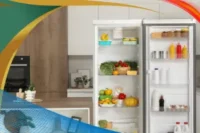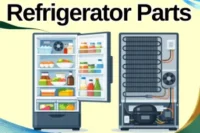The Future of Air Conditioning Technology Explained Simply
Published: 28 Oct 2025
Have you ever thought about how your air conditioner will look in the next 10 years? Maybe it won’t just cool your room – it might clean the air, save electricity, and work with your phone. Interesting, right?
Air conditioning technology is very important in our daily lives. It keeps us cool on hot days, helps us sleep well, and protects our food and devices from heat. But as time goes on, the future of air conditioning technology is changing fast.
Before we talk about what’s coming next, let’s first understand what air conditioning technology is and why it’s important for every home.
So, guys, are you ready?
What Is Air Conditioning Technology?
Air conditioning technology is what helps keep your room cool, fresh, and comfortable. It removes heat and humidity from the air, making your home a pleasant place to live. This technology also helps in keeping food, furniture, and electronic items safe from heat damage.
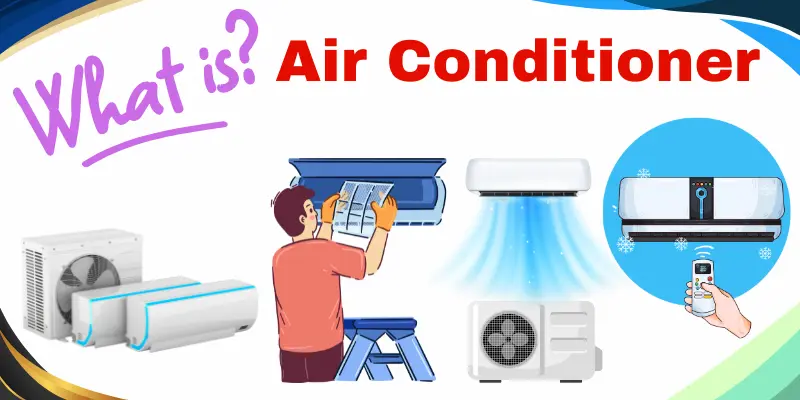
If you want to understand it in more detail, you can read our full guide. What Is an Air Conditioner?
1. Key Parts That Make It Work
An air conditioner has some main parts that work together to keep your room cool and fresh.
- Compressor: Pushes the gas (refrigerant) and helps it move through the system.
- Condenser Coils: Throw the hot air from your room outside.
- Evaporator Coils: Take in the heat from your room and make the air cool.
- Fan: Blows the cool air inside and pushes the warm air out.
- Thermostat: Checks and controls the room temperature.
2. Common Types of Air Conditioners
There are different kinds of air conditioners made for different needs and spaces.
- Split AC: Has two parts – one inside and one outside. It is quiet and saves power.
- Window AC: One single unit that fits in a window, good for small rooms.
- Inverter AC: Uses smart control to save electricity.
- Portable AC: You can move it from one room to another easily.
- Smart AC: You can control it with your phone or Wi-Fi from anywhere.
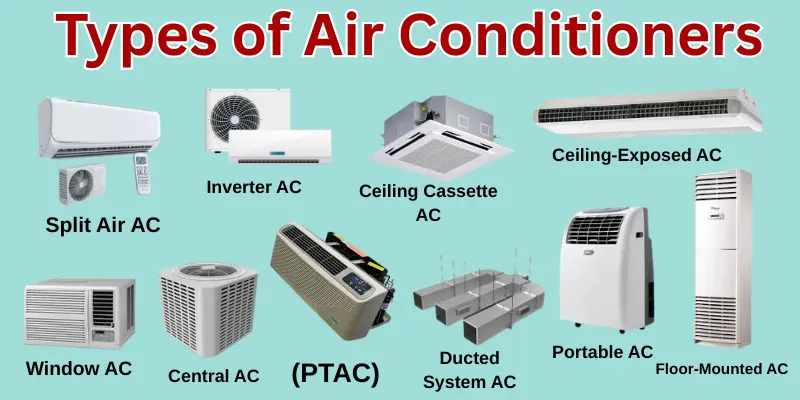
To learn more, you can read our full guide on Types of Air Conditioners.
3. Why This Technology Matters for Comfort and Energy Use
Modern air conditioning technology gives you comfort while saving energy.
For example, an old window AC uses the same power all the time, even when your room is already cool. But a new inverter AC changes its speed and power as needed. This saves electricity, keeps the room temperature steady, and makes less noise.
That’s why the future of AC technology is moving toward smarter and greener cooling solutions.
How Air Conditioning Technology Has Evolved
Air conditioning has changed a lot over the years. From simple machines to smart systems, the journey shows how cooling has become more comfortable and efficient.
1 Early Cooling Systems
In the beginning, air conditioners were basic and used a lot of electricity. They had manual controls, made loud noise, and didn’t cool rooms evenly. Most old models used harmful gases that were not safe for the environment.
2 Modern Upgrades
Today’s air conditioners are much smarter and safer.
- Smart sensors help control the temperature better.
- Inverter systems save electricity and keep cooling steady.
- Eco-friendly gases are used now, which protect nature and reduce pollution.
3 What’s Still a Challenge
Even with all these improvements, some problems remain.
- Many ACs still use a lot of power.
- Gas leaks can happen and reduce cooling.
- Repairs and parts can be costly for modern units.
So, while technology is improving fast, there’s still room to make air conditioners even better and more energy-saving in the future.
The Future of Air Conditioning Technology
The future of AC technology is full of smart and eco-friendly ideas. New systems are being made to use less power, protect nature, and give better comfort to people. Let’s look at what changes are coming in the next few years.
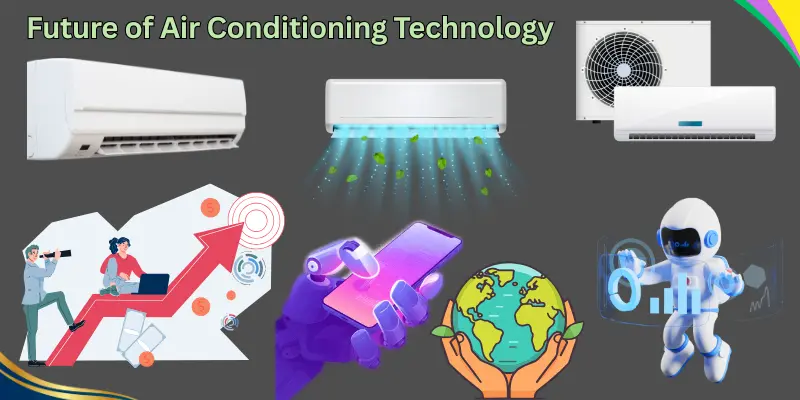
1 Smarter, Connected Air Conditioners
In the coming time, air conditioners will be more connected and easier to use. They will learn your habits and keep the perfect room temperature for you.
- You can control them with voice commands or mobile apps.
- They will connect to Wi-Fi and other smart home devices.
- AI systems will adjust cooling based on weather and room use.
- Brands like LG, Daikin, and Samsung are already working on smart cooling systems.
2 Eco-Friendly & Energy-Saving Cooling
Future ACs will focus more on saving energy and caring for the planet.
- Solar air conditioners will use sunlight for cooling.
- New refrigerants will produce less pollution and be safe for nature.
- Inverter systems will help cut down on electricity bills.
- Companies like Panasonic and Mitsubishi are testing green cooling methods.
3 New Cooling Techniques
Cooling methods are also changing with new and exciting ideas.
- Magnetic cooling will use magnets instead of gas.
- Water-based cooling systems will replace chemical refrigerants.
- Solid-state cooling will bring quiet, compact, and safe machines.
- These methods will make ACs cleaner, smaller, and easier to handle.
4 ACs That Clean Air Too
Future air conditioners will not only cool but also clean the air you breathe.
- They will remove dust, smoke, and bad smells automatically.
- Some models will control humidity and keep the air fresh.
- Built-in air purifiers will make homes safer and healthier.
5 Self-Repairing and Self-Cleaning Systems
Maintaining an AC will become easier in the future.
- Self-cleaning coils will stop dirt from building up.
- Smart sensors will find small issues before they become big.
- Some ACs will fix minor problems on their own.
- This means fewer service calls and longer machine life.
6 Affordable and Portable Smart Units
Future ACs will also be designed for everyone.
- Small, portable models will cool rooms quickly.
- Some will be battery-powered for outdoor use.
- Wearable cooling devices may keep your body cool anywhere.
- Prices will become lower, so more people can enjoy smart cooling.
The future of air conditioning technology is about comfort, care, and clean energy. It promises cooler homes, fresher air, and smarter machines that make life easier and greener.
What the Future Means for Homeowners
The future of air conditioning technology is bringing big changes for homeowners. It’s not just about cooling anymore – it’s about saving energy, improving comfort, and making life easier with smart and eco-friendly machines.
1 Benefits You Can Expect
Future air conditioners will offer more comfort and savings than ever before.
- Lower electricity bills with an inverter and variable-speed systems.
- Better air quality through built-in air filters and purifiers.
- Smarter cooling that adjusts automatically to room temperature.
- Quiet operation with advanced compressors and fan systems.
- Eco-friendly cooling using green refrigerants and solar support.
- Longer lifespan because of better design and durable materials.
- Climate-ready models like T3 air conditioners that work even in very hot areas are becoming popular, showing how strong and efficient future ACs will be.
2 How to Choose a Future-Ready AC Today
If you want to buy an AC that’s ready for the future, look for one that has the right mix of smart and energy-saving features.
- Pick an inverter AC that adjusts power use based on cooling needs.
- Go for smart control options like Wi-Fi, remote apps, or voice commands.
- Choose eco-friendly refrigerants such as R32 or R290.
- Check the Energy Star rating for power efficiency.
- Look for multi-stage filters that clean dust and bacteria from the air.
- Prefer brands that offer strong cooling in extreme weather, just like T3 models made for very hot climates.
- Pick an AC with long warranties and easy service support.
3 How to Maintain Your AC to Keep It Future-Fit
Even the smartest AC needs care to stay in good condition. Simple steps can make it last longer and keep it running smoothly.
- Clean air filters every 15–20 days for better airflow.
- Check coils and fins for dirt and dust buildup.
- Make sure the installation is proper and there are no gas leaks.
- Keep outdoor units clear of leaves, dust, or water.
- Get yearly maintenance from a professional technician.
- Use power stabilizers to protect against voltage changes.
- Run the AC on eco or energy-saving mode whenever possible.
By following these steps, you can enjoy cool, clean, and energy-efficient air for years. The future of AC technology is already here – smarter, stronger, and built for modern homes.
Challenges and Concerns Ahead
The future of AC technology looks bright, but there are still a few challenges that need to be solved. As cooling systems become smarter and greener, some problems may slow down their use around the world.
High Initial Cost of Smart ACs
New air conditioners with smart features, sensors, and inverter systems often cost more than regular ones. This higher price makes it hard for many people to buy them, especially in areas where income levels are low.
Need for Global Refrigerant Changes
Many old air conditioners still use refrigerants that harm the environment. To move toward a cleaner future, all countries must switch to eco-friendly gases like R32 or R290. But this change needs new equipment, training, and global rules – which will take time.
Power Supply and Smart-Grid Limits
Modern air conditioners need steady electricity and sometimes smart-grid support to work properly. In places with weak or unstable power, using smart or solar ACs can be difficult.
Technology Adoption in Developing Regions
Many developing countries still depend on basic cooling systems. Bringing new air conditioning technology to these areas will take time, investment, and awareness. People need to understand the benefits of energy-saving systems to start using them.
Even with these challenges, the future of air conditioning technology is full of promise. With better designs, cleaner energy, and wider use, these problems can be solved step by step.
Conclusion
Hey guys, in this article, we learned what air conditioning technology is, how it works, how it has changed over time, and what the future of air conditioning technology looks like. We talked about smart ACs, eco-friendly cooling, self-cleaning systems, and new technologies like solar and magnetic cooling. These new ideas are not just making our homes more comfortable – they are also helping us save energy and protect the environment.
From old window units to modern inverters and smart systems, air conditioning has come a long way. And the best part? The future looks even brighter – with advanced, cleaner, and smarter cooling systems that fit every home.
My personal advice: If you plan to buy a new AC, look for inverter or smart models with eco-friendly refrigerants. They may cost a little more now, but they’ll save you money and energy in the long run.
So, what do you think about these new cooling technologies? Are you ready for the future of air conditioning?
👉 Share your thoughts in the comments and explore more of our guides to keep your home cool and energy-smart!
Common Questions and Answers
Here we will discuss some common questions that may be on your mind about air conditioning and its future. Let’s look at them one by one.
Modern air conditioners do more than just cool the air. They come with filters that remove dust, smoke, and bad smells from your room. Some models also control humidity to keep the air fresh and comfortable. This makes your home cleaner and safer to breathe in.
In the future, air conditioners can work directly on solar panels without using extra circuits or batteries. This idea is still being tested, but companies are trying to make it possible. If it happens, homes can enjoy cooling straight from sunlight, making it cheaper and cleaner to use.
Many people forget to clean the air filters regularly, which blocks airflow and increases power use. Some set the temperature too low, thinking it will cool faster — but that only wastes electricity. Poor installation and skipping yearly service also reduce the cooling and the life of the AC.
As the world gets hotter, the demand for air conditioners is growing fast. To handle this, companies are making ACs that use less power and work well even in extreme heat. New cooling systems also use gases that are safe for the environment. Climate change is pushing the industry to go green and smart at the same time.


